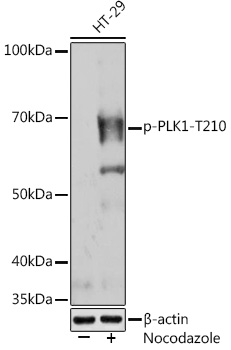Cell Cycle Antibodies 2
Anti-Phospho-PLK1-T210 Antibody (CABP1025)
- SKU:
- CABP1025
- Product Type:
- Antibody
- Reactivity:
- Human
- Host Species:
- Rabbit
- Isotype:
- IgG
- Antibody Type:
- Monoclonal Antibody
- Research Area:
- Cell Cycle
Description
| Antibody Name: | Anti-Phospho-PLK1-T210 Antibody |
| Antibody SKU: | CABP1025 |
| Antibody Size: | 20uL, 50uL, 100uL |
| Application: | WB |
| Reactivity: | Human |
| Host Species: | Rabbit |
| Immunogen: | A phospho specific peptide corresponding to residues surrounding T210 of human PLK1 |
| Application: | WB |
| Recommended Dilution: | WB 1:500 - 1:2000 |
| Reactivity: | Human |
| Positive Samples: | HT-29 |
| Immunogen: | A phospho specific peptide corresponding to residues surrounding T210 of human PLK1 |
| Purification Method: | Affinity purification |
| Storage Buffer: | Store at -20°C. Avoid freeze / thaw cycles. Buffer: PBS with 0.02% sodium azide, 0.05% BSA, 50% glycerol, pH7.3. |
| Isotype: | IgG |
| Sequence: | Email for sequence |
| Gene ID: | 5347 |
| Uniprot: | P53350 |
| Cellular Location: | |
| Calculated MW: | 68kDa |
| Observed MW: | 68KDa |
| Synonyms: | PLK, STPK13 |
| Background: | The Ser/Thr protein kinase encoded by this gene belongs to the CDC5/Polo subfamily. It is highly expressed during mitosis and elevated levels are found in many different types of cancer. Depletion of this protein in cancer cells dramatically inhibited cell proliferation and induced apoptosis; hence, it is a target for cancer therapy. [provided by RefSeq, Sep 2015] |
| UniProt Protein Function: | PLK1: a kinase of the PLK family. Contains a polo-box domain (PBD), a specific phosphoserine or phosphothreonine binding domain. Substrates include BRCA2, Myt1, NudC, Cdc25C, cyclin B1, Nlp and other mitotic proteins. Inhibited by ATR. Plays a role in regulation of cytokinesis and coordinating M-phase events. |
| UniProt Protein Details: | Protein type:EC 2.7.11.21; Protein kinase, Ser/Thr (non-receptor); Kinase, protein; Protein kinase, Other; Other group; PLK family Chromosomal Location of Human Ortholog: 16p12.2 Cellular Component: spindle pole; centrosome; cytosol; kinetochore; microtubule cytoskeleton; nucleoplasm; spindle microtubule; cytoplasm; nucleolus; spindle; midbody; spindle midzone; nucleus Molecular Function:protein serine/threonine kinase activity; protein binding; microtubule binding; kinase activity; protein kinase binding; ATP binding; protein kinase activity Biological Process: positive regulation of ubiquitin-protein ligase activity during mitotic cell cycle; positive regulation of proteolysis; regulation of cell cycle; regulation of mitotic cell cycle; mitotic nuclear envelope disassembly; protein ubiquitination; anaphase-promoting complex activation during mitotic cell cycle; cytokinesis; negative regulation of transcription from RNA polymerase II promoter; protein amino acid phosphorylation; response to antibiotic; establishment of protein localization; cytokinesis after mitosis; centrosome organization and biogenesis; anaphase-promoting complex-dependent proteasomal ubiquitin-dependent protein catabolic process; positive regulation of ubiquitin-protein ligase activity; mitotic cell cycle spindle assembly checkpoint; G2/M transition of mitotic cell cycle; mitosis; protein destabilization; mitotic sister chromatid segregation; organelle organization and biogenesis; regulation of mitotic metaphase/anaphase transition; negative regulation of cyclin-dependent protein kinase activity; cell proliferation; peptidyl-serine phosphorylation; regulation of ubiquitin-protein ligase activity during mitotic cell cycle; regulation of protein binding; positive regulation of proteasomal ubiquitin-dependent protein catabolic process; polar body extrusion after meiotic divisions; mitotic cell cycle; G2/M transition DNA damage checkpoint; microtubule bundle formation; mitotic metaphase/anaphase transition; negative regulation of apoptosis |
| NCBI Summary: | The Ser/Thr protein kinase encoded by this gene belongs to the CDC5/Polo subfamily. It is highly expressed during mitosis and elevated levels are found in many different types of cancer. Depletion of this protein in cancer cells dramatically inhibited cell proliferation and induced apoptosis; hence, it is a target for cancer therapy. [provided by RefSeq, Sep 2015] |
| UniProt Code: | P53350 |
| NCBI GenInfo Identifier: | 1709658 |
| NCBI Gene ID: | 5347 |
| NCBI Accession: | P53350.1 |
| UniProt Secondary Accession: | P53350,Q15153, Q99746, |
| UniProt Related Accession: | P53350 |
| Molecular Weight: | 68,255 Da |
| NCBI Full Name: | Serine/threonine-protein kinase PLK1 |
| NCBI Synonym Full Names: | polo-like kinase 1 |
| NCBI Official Symbol: | PLK1 |
| NCBI Official Synonym Symbols: | PLK; STPK13 |
| NCBI Protein Information: | serine/threonine-protein kinase PLK1; PLK-1; polo like kinase; polo (Drosophia)-like kinase; serine/threonine-protein kinase 13; cell cycle regulated protein kinase |
| UniProt Protein Name: | Serine/threonine-protein kinase PLK1 |
| UniProt Synonym Protein Names: | Polo-like kinase 1; PLK-1; Serine/threonine-protein kinase 13 |
| Protein Family: | Phosphoadenosine phosphosulfate reductase |
| UniProt Gene Name: | PLK1 |
| UniProt Entry Name: | PLK1_HUMAN |







